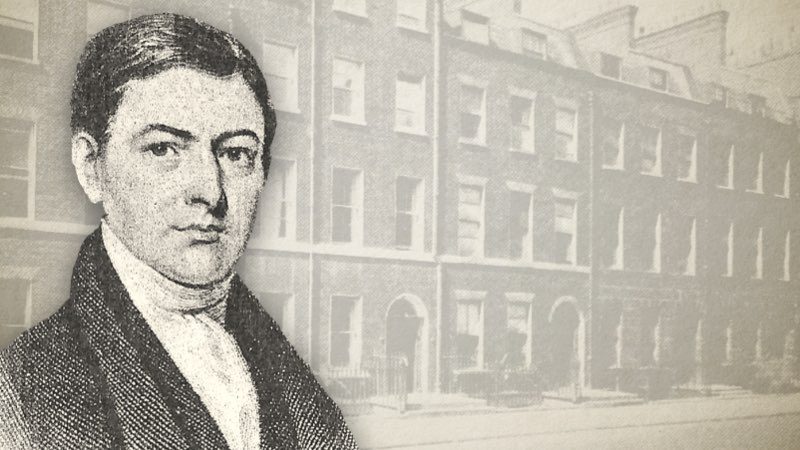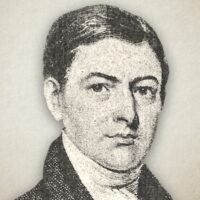
The Efficacy Of God’s Word
“Is not My Word like as a fire? saith the Lord; and like a hammer that breaketh the rock in pieces?”—Jeremiah 23:2
By a variety of comparisons, the Lord conveys His mind and will unto us. Seeing we are dull of apprehension, He uses words expressive of things with which we are familiar.
Fire softens and melts the hardest metals, and is capable of consuming all that is consumable. The Word of the Lord tries sinners’ hearts and ways, and all their carnal notions and vain thoughts of God are consumed by the fire of His Word. God’s fire is attended with light, and that light discovers the darkness of the sinner’s heart, but the darkness comprehends it not: “The entrance of Thy words giveth light; it giveth understanding unto the simple” (Psa. 119:130). This fire dissolves stony hearts, and makes the affections soft, as Job saith, “For God maketh my heart soft, and the Almighty troubleth me” (Job 23:16). See how soft the fire of Christ’s word made Saul of Tarsus. He that could look on with pleasure while they stoned Stephen to death, and hold the clothes of Stephen’s murderers—he that could drag the disciples of Jesus, male and female, from their peaceable habitations, forth to the council to be punished—whose zeal burned even to madness, was soon melted down to prayer by the voice, “Saul, Saul, why persecutest thou Me?”
The natural softness sometimes seen in persons must be distinguished from those feelings produced in a sinner by the light of life. There may be the most tender, humane feelings in a person, and not one spark of grace. The heathens showed Paul and his companions no little kindness—and, indeed, their kindness should make professors of religion blush—but they were idolaters, and worshipped not the true God, but had “lords many and gods many,” and would have worshipped Paul had he allowed it. God’s powerful Word consumes all idolatrous notions, and turns a sinner’s feet to God’s testimonies, as Paul shows: “For they themselves show of us what manner of entering in we had unto you, and how ye turned to God from dumb idols to serve the living and true God” (1 Thess. 1:9). Nature cannot rise above itself. All the efforts of man leave him destitute of life. “He that hath the Son hath life; and he that hath not the Son of God hath not life” (1 John 5:12).
God’s fire consumes that confidence which in ignorance is founded upon the free-will and ability of the creature to love, serve, and obey the holy law of God, which is a fleshly confidence, quite distinct from that well-grounded confidence begotten in the heart of a sinner by the Holy Ghost. We are the circumcision, which worship God in the spirit, and rejoice in Christ Jesus, and have no confidence in the flesh” (Phil. 3:3). Paul, and those to whom he wrote, were once building upon a sandy foundation, trusting to their own dead performances, which was a refuge of lies; but God’s fire burned them out of their nest, and destroyed their false hiding-place. Every man will ground his confidence upon some fleshly thing, till God burns it up with His fire. ”The fire shall try every man’s work.”
This fire is also designed to warm cold hearts, and make them burn with love to Jesus Christ and His people: “Did not our heart burn within us while He talked with us by the way, and while He opened to us the Scriptures?’’ said the two disciples as they were going to Emmaus (Luke 24:32). Thus the Word of life from the lips of Christ was a fire that warmed their heart, nor could they forget it, not to their dying day perhaps! Oh, for more of that heart-warming power which alone dissolves the desperate hardness of our flinty hearts! I sometimes tremble at my own hardness, and “wonder where the scene will end.” Oh, God of my salvation, “create in me a clean heart, and renew a right spirit within me,” for nothing less than Thy holy fire can warm such a cold, death-like heart as mine!
The Lord not only compares His Word to a fire, but also to a hammer, the use of which is known to every one. Of itself it is useless. It must be taken in the hand, and power must be used, with a right aim, or nothing is effected. So the Lord must use His Word by His own hand of divine power, guided by His wisdom, and then it “breaks the rock in pieces;” that is, the sinner’s hard heart, fitly compared to a rock. God makes His Word to reach the sinner’s conscience: “Hearken unto Me, ye stout-hearted, that are far from righteousness: I bring near My righteousness; it shall not be far off, and My salvation shall not tarry; and I will place salvation in Zion for Israel My glory” (Isa. 46:12, 13). There are, no doubt, different effects produced by the same power. The Word like a fire operated on Lydia’s heart, and kindled in her bosom a sweet love to the Lord and His dear servants, which was evidenced in her speech and conduct: “If ye have judged me faithful, come into my house;” and, when the Apostles were liberated from prison, they entered Lydia’s house, who no doubt received them joyfully. Many poor sinners have their affections first wrought upon by hearing the Word preached, but no great terror may attend them for a time. The Word has operated with a silent sweetness, slaying their enmity, subduing their rebellion, and constraining them to love Jesus, His people, and His ways. If a sinner is brought here, he is doubtless taught of God, though his judgment may be badly informed, and the fountain of the great deep, his heart’s depravity, may not be broken up or discovered to him, as it may be at a future period. Let not such write bitter things against themselves, but bless God for opening their blind eyes sufficiently to see that “there is no other name under heaven given amongst men whereby we must be saved” but the name of Jesus. The natural judgments of men may be very well informed in spiritual doctrines, obtained by reading, hearing, or conversation; and, on the other hand, the judgments of some living souls may be much confused touching many great and sublime truths. We should look more after the power of religion, which will manifest itself in them that have it, in God’s good time, rather than be carried: away with the noisy speech of ma.ny who are puffed up with pride and vain glory.
These remarks are intended for the encouragement of some who are weak in faith—not to make them slothful, but to stir them up to prayer and diligence, in God’s appointed means, till He enables them to say, “My Beloved is mine and I am His.” The case of the jailor at Philippi differs from Lydia’s, for on the jailor’s heart the Word of God came like a sledge-hammer. I suppose the jailor to have been a most desperate character, using the poor persecuted prisoners most cruelly; but what rebel can stand before Omnipotence? He that thrust Paul and Silas into the inner prison, and made their feet fast in the stocks, was employed the same night in taking them out of prison, taking them to his house, and washing their wounds, no doubt with weeping eyes, and feeding them at his own table with better than prisoners’ fare. The earthquake shook the prison, and threw open the prison doors, but God was not seen in the earthquake, for the jailor was about to kill himself; but, when Paul’s voice was heard, “Do thyself no harm, for we are all here,” the Lord smote the rebel’s heart with the hammer of His Word. Paul’s was not a carnal weapon, but a spiritual one, and did prove mighty through God. The lion becomes a lamb, trembles before the suffering prisoners, falls at their feet, and anxiously cries, “Sirs, what must I do to be saved?” Thus the Word was as “a hammer that breaketh the rock in pieces.” Paul immediately preached to the trembling jailor the doctrine of faith and salvation by Jesus Christ: “Believe on the Lord Jesus Christ, and thou shalt be saved.” The word of salvation broke his hard heart, and “he set meat before them, and rejoiced, believing in God with all his house” (Acts 16:34); so that the same powerful word reached the hearts of all his family. Whether they were all grown to the age of maturity I know not, but it is evident they were old enough to confess Jesus Christ. What a highly-favoured family! Instead of oaths and curses and all manner of abominable conversation, I doubt not but they were heard conversing of the almighty power, grace, and goodness of the Lord, and singing His high praises with joyful lips. David’s sublime description of God’s presence and power with Israel when they escaped from Egypt, passed the Red Sea, and at last the Jordan, to enter the promised land, may be applied to the jailor: “What ailed thee, O thou sea, that thou fleddest? thou Jordan, that thou wast driven back? ye mountains, that ye skipped like rams? and ye little hills like lambs? Tremble, thou earth, at the presence of the Lord, at the presence of the God of Jacob; which turned the rock into a standing water, the flint into a fountain of waters” (Psalm 114:5-8).
“God of all-sufficient power,
Use the hammer of Thy Word;
Let this be the joyful hour,
Let Thy captives be restored.
”Break the stubborn sinner’s heart;
Break his adamantine chains;
Rays of light and joy impart
To the soul where darkness reigns.
“Let Thy mighty Gospel’s sound
Reach the imprisoned sinner’s soul,
Till, like “legion,” he is found
In his right mind, clothed, and whole.
“Make the trembling soul rejoice
With Thy oil and cheering wine;
Then we’ll sing with heart and voice,
‘Endless praises, Lord, be Thine.'”
Henry Fowler (1779-1838) was an Independent sovereign grace preacher and hymn writer. In 1813, he assumed responsibility for a gospel work in Birmingham. He removed to London in 1819, serving as pastor of Gower Street Chapel. The original congregation met in a chapel on Conway Street, and were followers of William Hintington’s ministry. Upon Mr. Fowler’s acceptance of the call to serve as pastor, a new chapel was built on Gower Street. This chapel (now demolished) was the predecessor to the old Gower Street Memorial chapel on Shaftesbury Avenue.




